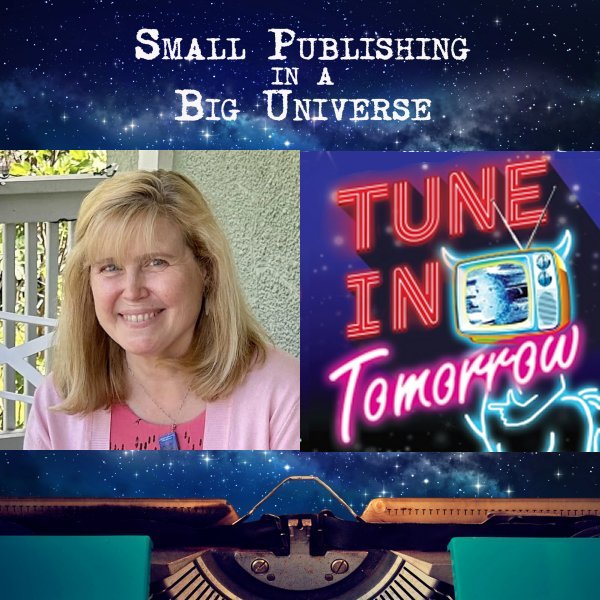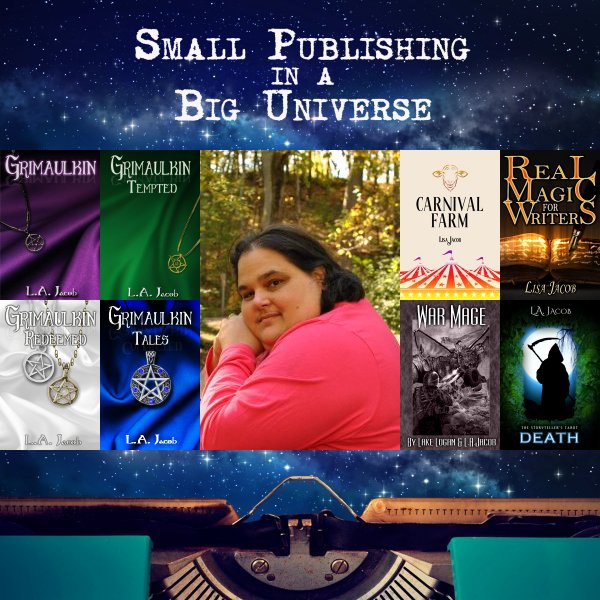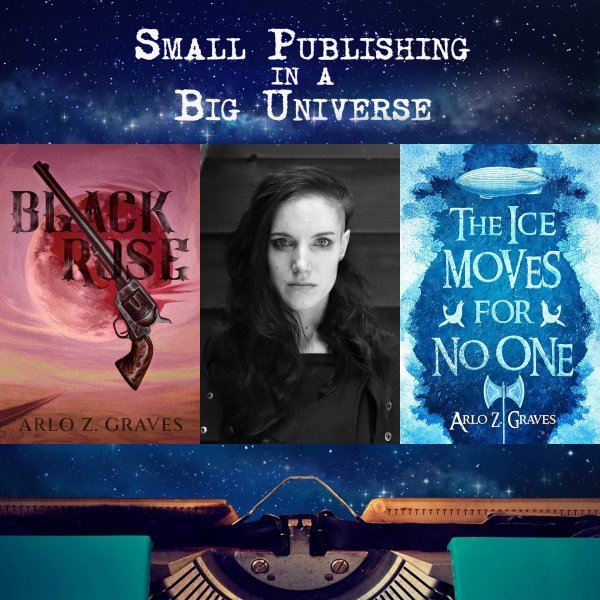Episode Transcript
LA Jacob 00:00:09 Hello and welcome to Small Publishing in a Big Universe. I am your host, LA Jacob. Since this is our first episode, let me take a few moments to tell you who we are. Small Publishing in a Big Universe is a podcast that we've been wanting to do for quite a long time. Our goal is to bring you interviews and discussions about a variety of publishing and writing related topics. Although it is aimed primarily at independent authors and small publishers, we think that many readers may also enjoy the insights into, as one of our colleagues put it, how the sausage is made. While that might be our primary goal, we hope to also be entertaining and have a little fun along the way. For now, we intend to publish once a month. Follow us on social media to find out when new episodes become available. Welcome to our podcasting journey.
LA Jacob 00:01:06 This episode we have part one of an interview with Steven Radecki, the managing editor of Paper Angel Press. Coming up this episode of Small Publishing in a Big Universe is sponsored by Paper Angel Press. Paper Angel Press publishes general fiction and mysteries under their own name, with two additional imprints, Water Dragon Publishing for science fiction and fantasy, and Unruly Voices for non-fiction and poetry. Watch for these books coming soon from Paper Angel Press to online book sellers near you within the next few weeks on August 15th. From their Unruly Voices imprint comes Artisanal Gibberish Two by Matthew Lager, which will present more um, poetry. Also coming in August is the latest story in the Dragon Gems short fiction program, the Alchemist's Daughter by Paul S Moore. A Tale about a king, a troubador, and a fine lady. Seeker, a high fantasy novel, which is Book one of the Unwoven Tapestry series by Morgan Shalut is slated to come out from Water Dragon Publishing in September and it’s audio book August.
Sign up for their mailing list at waterdragonpublishing.com slash free audiobook and register for a chance for a free audiobook of your choice from any of their imprints. Right now here's some more information about creating your own Dragon Gems.
LA Jacob: Hello authors. Do you have a science fiction or fantasy short story under 10,000 words in your drawer of unpublished work and you don't know what to do with it? You can submit it to Water Dragon Publishing's short story program, Dragon Gems. To view the current Dragon Gems, go to Water Dragon Publishing all one word .com/dragon gems. You'll find high quality, well-produced short stories, and if you have a fantasy or science fiction short story, they will be happy to take a look at it. For more information, go to water dragon publishing.com/submissions.
LA Jacob: Hi and welcome back. Today's guest is Steven Radecki, the owner and managing editor of Paper Angel Press. We discuss the different imprints and what he expects of an author when submitting a manuscript and what is expected of an author when you're signed up with his publishing company. Next time we will be discussing a little bit about marketing and promotion. If you would like to participate in our future, Ask the Publisher podcast. Go to S p B U podcast.com and press the ask us link at the top. And here's the interview.
LA Jacob 00:04:25 Hi. And here is Steven Radecki, owner and managing editor of Paper Angel Press. Welcome Steven.
Steven Radecki 00:04:33 Thank you for having me.
LA Jacob 00:04:35 So the first question that I have is what are the different imprints with Paper Angel Press and why did you create them?
Steven Radecki 00:04:44 So right now we have three imprints. We have, uh, paper Angel Press, which is kind of also the parent company, I'll call it the main imprint for lack of a better term because we haven't yet come up with a clever name for it. Uh, focuses on mysteries and more general literary type fiction. We have unruly voices, which is where we're publishing our memoirs, our self-improvement books and our poetry. And then we have Water Dragon Publishing, which is our imprint dedicated to fantasy and science fiction. You ask why we created them. Originally, everything was under Paper Angel Press and as our catalog grew, it became more and more difficult to give some of the books, some of the attention they deserved based on their audiences because things were getting lost. If, if we were promoting like the Mysteries, then the, the fantasy books weren't getting promoted. If we're doing the poetry, then something else wasn't being promoted because they were all under the same brand for lack of a better term. Um, and it also made it very confusing when we went to conventions and other events that were very genre specific because okay, people would be confused about, well you've got all these other books. And so we felt like separating it into the separate imprints would allow us to do much better targeted marketing at specific audiences. So for like the science fiction conventions, we'll go in as Water Dragon publishing. If we're at local health fairs for example, we'll probably go Unruly Voices.
LA Jacob 00:06:15 What do you expect from a submission?
Steven Radecki 00:06:17 The first thing I'm gonna look for, to be honest, is I'm gonna look for is the submission formatted properly? Are you behaving like a professional author out the gate. And you, you would be surprised or maybe you wouldn't <laugh> how many submissions we get where there's no page numbers, no headers, there's, you know, there's none of the basics that have part been part of manuscript for decades. So automatically you're, you know, like being in school, you're automatically doctored a grade <laugh> coming in before we, before we've even started reading it because it meant you can't follow instructions or you were, you were too lazy to do the research on which to figure out what a manuscript format should look like. I find it particularly irksome because we have a link on our submissions page that says, if you don't know what a manuscript format, here's what one looks like and there's a link that takes you there, there's really not a good excuse. You know, I don't know if some people may consider that nitpicky or petty or whatever. Uh, the, the other thing that I also recommend that authors not do, um, unfortunately this has only happened a couple of times, is they will paste their submission in the body of the email.
LA Jacob 00:07:30 You want it as an attachment?
Steven Radecki 00:07:32 <laugh> Yes, it should be attachment <laugh>. Granted the instructions are not exactly clear of that, but we kind of assume, you know, they've probably done it as a Word document or whatever and they're just going to, right? But yeah, we've had a couple where people have pasted the submission into the email, which makes it a little difficult to edit. The, the formats that we prefer are on the websites. So ideally Word, um, O D T or R T F, I've had some people send them in in PDF and that's okay cuz I can comment on those. I can, I can save those out as Word and add additional comment, not the end of the world. Everything else, you know, means we've gotta convert it into something we're using and bad things can happen. Step two to that is, so on the submissions page it's on there's other requirements of what we need from you. And it's all on the submissions page. It's all on, you know, what, what, what kind of stuff we accept, here's the information we need as part of it. It's all right there. So, you know, okay. Not just for us, but for any publisher read their submissions page and see what the requirements are because some of them, yeah, we're fairly flexible, but some of them are extremely strict and are like, only use this font and use this line spacing. They, they're very specific and if you don't follow those, they may not even look at it once you have it.
LA Jacob: And once it's looked at about how long does it take before you finally, before you get back to the author, whether or not it's been, um, accepted and do you tell them why it wasn't accepted?
Steven Radecki 00:09:09 We, we try really hard to let them know within 90 days. Don't always make it for anybody who understands. The publishing industry is actually just kind of unheard of because that's very fast. If you submit to an agent or a big publisher, be prepared to wait anywhere from six to 18 months whether we accept your manuscript or not. We will send you very specific feedback about the things we like or the things that we felt that need to be improved.
LA Jacob 00:09:34 You don't get a form letter?
Steven Radecki 00:09:35 No, no. That's part of the value we wanna add to the whole process and just kind of to the industry. Cuz we, we get some, actually, we get a fair number of submissions that are that close. You know, they're really, really good but like the middle needs some work or the end needs some work or there's a character that wasn't believable or their consistent use of the emdash was just maddening. And so we'll say, you know, we really, really enjoyed it. However, we don't wanna accept it at this time, but if you fix these things we'd really love to see it again.
LA Jacob 00:10:06 Oh, that, that's very helpful for the author because yeah, most everybody, oh, most most publishers will just say, okay, we don't like it. Bye.
Steven Radecki 00:10:15 Right. Well and as an author myself, I mean I I totally get the whole madness of the form letter thing cuz it's, it, it's useless as feedback. It tells you nothing about, well does the story suck were you just <laugh> overbooked this month. You do not like the fact that I use semicolons. If there's nothing actionable, which is, it's frustrating. Part of part of our philosophy is we wanna try to treat authors even ones that we don't accept the way that we would wanna be treated. And that's kind of our guiding principle. So we, we always try to give some feedback, uh, even if we accept it, you're also gonna get some feedback because very few manuscripts are perfect, but even if we accept it, it'll be, we really would like to work with you to publish this da da da. However, part of the terms is we would like you to change this thing and if they agree, we'll, we'll address it as part of the editing process. Right. Some authors, um, can be very stubborn. Okay. Uh, I'm willing to make those kinds of changes. You know, it, it's their story. That's fine. I can't that Yeah. It's, it's, it's, you knows their—
LA Jacob 00:11:18 Yeah. You just might not be the correct market. A next question is, what do you expect from an author when you signed them on?
Steven Radecki 00:11:27 Oh, when I signed them on, what I expect from an author is we really look at our publishing experience as a collaborative effort between us and the author, our authors, you know, we, we give them a lot of input and opportunity to participate in how we craft the messaging of their book, what the tagline's going to be, what the different versions of the summaries are gonna be. We allow them to have input into the cover design. We have, uh, we try to support them, them if they have local events that they wanna go to and participate in, because we're located out of Northern California and we can't be everywhere. So if somebody has a, a local event in, you know, Rhode Island or Kansas or whatever, you know, we have a set of materials that we can provide for them. Um, so if they're kind of going it alone, you know, it is like they're having to bear the, the whole the entire burden, their entire burden to cost.
Steven Radecki 00:12:20 So we can have them, we can have items, promotional items shipped to them and produced for them. And what we do when, what we develop a book is we put together what, what I call the press kit. But what it is, it's a, it's a collection of promotional items that the author can use to help promote their books. For example, there's, we do business cards. They have the book cover and then the URL and the summary on the back. We do those instead of bookmarks because we found one, they're a lot less expensive to produce than bookmarks and they're also easier for authors to just carry around than bookmarks cuz they fit in your pocket and they fit in the standard, uh, you know, business card case or little business card holders or whatever. And we also do, uh, postcards, we do social media banners, um, and, and several other things that we provide as part of the, okay, author, here's your book, here's a bunch of stuff that you can post on your social media, send out the, uh, readers or whatever.
Steven Radecki 00:13:12 So we, we try to try to, you know, we have all that ready before the book is launched so that they can start the process. The the other thing is as they're promoting their book, we also expect them to also help us promote our other books and our press. So if, you know, if they see that, you know, we're promoting this book, uh, you know, on social media, we would like them to like and share that. Or if we have some particular announcement we would like to, to like and share that as well. Cause yeah, cuz they're followers and their friends or whatever may be also interested in some of the other stuff that we have, but they need to know about that. It's
LA Jacob 00:13:42 There. Thanks again to Steven Radecki for participating in our interview. Stay tuned for next time when we will be talking about marketing and promotion. Matthew
Speaker 4 00:13:53 Matthew Lager, the person to blame for Artisanal Gibberish here, in case you can't get enough Artisanal Gibberish. There's more on the way. Artisanal Gibberish two will be available August 15th with yet more man poetry. Just don't think about it too much. You can get both Artisanal Gibberish one and Artisanal Gibberish two yet more gibberish in trade paper packer Digital editions from Amazon, Barnes and Noble, Kobo, Smash words or other online book sellers. Or you can support your local independent bookstores by ordering it through bookshop.org or indiebound.org. For more information, visit unrulyvoices.com/artisinalgibberish. See, I told you I could do this in 30 seconds. Ha!
LA Jacob 00:14:21 Thanks again to our guest. We plan on publishing new episodes every second Wednesday of the month. Watch for new episodes around that time. Music is provided by Melody Loops. If you want to know more about small publishing in a big universe, visit our website at S p b u-podcast.com. Tweet us at S P B U dash podcast and like us on Facebook at S P B U dash podcast. This podcast was recorded and edited by yours truly, LA Jacob. This month's episode was sponsored by Paper Angel Press and its imprints Water Dragon Publishing and Unruly Voices. Thanks for listening and talk to you soon.


